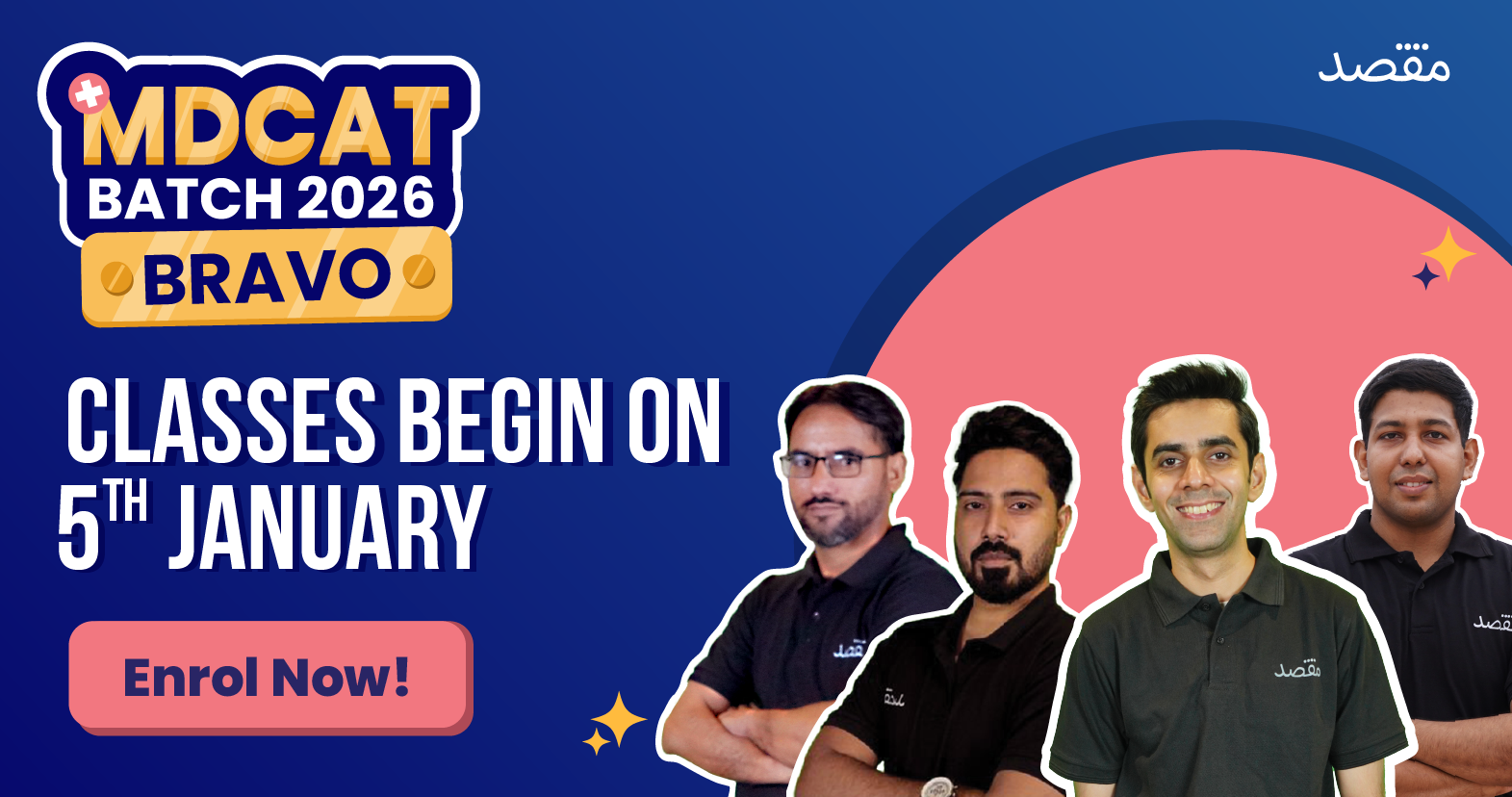
MDCAT Bravo Batch 2026
Early Admissions Open!
Kick off your MDCAT prep with daily live classes starting from 5th January! Cover the entire syllabus, attempt weekly tests and get counselling from expert teachers like Dr. Akbar

Early Admissions Open!
Kick off your MDCAT prep with daily live classes starting from 5th January! Cover the entire syllabus, attempt weekly tests and get counselling from expert teachers like Dr. Akbar

Admissions are open!
Enjoy daily live classes and recorded lectures with EDGE Learning mentors – Sir Ahmer, Sir Saad & Miss Maryam exclusively on the Maqsad app.

Want to ace the ECAT exam?
Join Maqsad’s ECAT batch, designed for high-scoring students aiming for UET, NUST, GIKI & more. With live classes, MCQs and more, secure your seat in UET Round 1 + NET Round 2 + IBA CS R1 + others!
The engineering entrance test is a defining moment for students aspiring to secure admission into Pakistan’s top-tier engineering universities like FAST, GIKI, Dawood University, Mehran University, and others. Success in this test paves the way for a bright future in engineering, and acing it requires a comprehensive preparation strategy.
Every year, thousands of students sit for the ECAT (Engineering College Admission Test)—a general term used for entrance exams across universities—making it one of the most competitive exams in the country. If you’re aiming to get into a prestigious engineering program, it’s vital to not just prepare but master the test. Here’s how you can strategically plan your preparation to ensure your success.
Click here if you are interested in the best Fields after FSC Pre-Engineering in Pakistan.
The engineering entrance test assesses a student's grasp of core subjects like Physics, Chemistry, and Mathematics, with some tests including sections on English and analytical reasoning. The test is time-sensitive and consists mostly of multiple-choice questions (MCQs). Each correct answer scores points, while some universities enforce negative marking for incorrect answers.
Universities like FAST, GIKI, Dawood, Mehran University and more conduct their own versions of the engineering entrance test, but all of them broadly focus on testing your conceptual clarity and ability to solve problems under time pressure.
Here’s a step-by-step guide to help you create a powerful plan to ace the toughest engineering entry tests of Pakistan:
Preparing for the engineering entrance test demands a meticulous study plan that covers the entire syllabus while leaving room for revision and practice tests.
Understanding the test structure is crucial. Each university’s test has slight variations, but the core subjects—Physics, Chemistry, and Mathematics—remain the same. Check the official syllabi of the universities you're targeting, and prioritize the topics based on weightage and difficulty. For instance, calculus, electromagnetism, organic chemistry, and heat and thermodynamics are typically high-priority topics across all tests.
Time is your greatest asset when preparing for the engineering entrance test. Create a study schedule that dedicates ample time to each subject while allowing for breaks and mock tests. Allocate more time to areas where you feel less confident. For example, if you struggle with Chemistry, spend additional hours on organic chemistry and chemical bonding, and use resources like video lectures or online study tools to strengthen your understanding.
Practicing through mock tests for engineering entrance is one of the most effective ways to master the test. Mock tests simulate the actual test environment, helping you become familiar with the question types and the pressure of a timed exam. Platforms like Maqsad offer free access to mock tests for all subjects, including Physics, Chemistry, and Mathematics, providing students with targeted practice.
Taking mock tests regularly enables you to identify your weak areas and helps improve your speed and accuracy. These mock tests also simulate the actual pressure of the exam day, helping you overcome any anxiety or nervousness. This way, when the actual exam arrives, you will be well-prepared to remain calm and composed.
In the entrance test for engineering, managing time efficiently is crucial. With each section demanding your undivided attention, mastering time management becomes a necessity. During mock tests, practice pacing yourself to ensure that you have enough time for each section. For instance, if you find that mathematics questions consume more time, work on solving problems faster by focusing on shortcuts and problem-solving techniques.
One of the most critical factors in succeeding in the engineering entrance test is having a strong grasp of concepts. The questions in Physics, Chemistry, and Mathematics are designed to test your understanding, not just your memory. To excel, it’s essential to prioritize conceptual learning over rote memorization.
For instance, in Mathematics, instead of merely memorizing formulas, understand the logic behind calculus, differential equations, and trigonometry. Similarly, in Chemistry, focus on understanding the mechanisms of organic reactions rather than just memorizing them. This will allow you to approach complex questions with confidence.
Using online resources such as video lectures on Maqsad can significantly aid your learning process. These platforms break down difficult concepts into easy-to-understand lessons, ensuring that students can grasp even the most challenging topics.
In recent years, the integration of technology in education has proven to be a game-changer for students preparing for competitive exams like the engineering entrance test. Mobile apps and online study platforms provide students with access to high-quality study material, diagnostic tests, and subject-specific quizzes.
One of the biggest advantages of using educational technology is the instant feedback on mock tests and quizzes. With real-time performance analysis, students can easily pinpoint their weaknesses and adjust their study plans accordingly. Furthermore, many platforms offer detailed explanations of answers, making it easier to understand where mistakes were made.
Moreover, such platforms offer features like personalized study schedules, performance tracking, and expert-led video lectures on complex topics like calculus and electromagnetism. These tools make preparation more targeted, helping students manage their time efficiently while staying on track with their syllabus.
Once the exam is over, your engineering entrance test result plays a crucial role in determining whether you gain admission to your desired university. Most universities follow a merit-based system, combining the test result with your academic record to create a merit list. Institutions like FAST, GIKI, Dawood, and Mehran University give significant weight to the entrance test, and excelling in this exam boosts your chances of being admitted into the top engineering programs.
Universities typically release their results a few weeks after the test, and you should regularly check official websites for updates. Once the merit lists are published, you can assess your standing and take the necessary next steps for admissions.
If you’re planning to appear for the engineering entrance test, now is the perfect time to start your preparation. Staying updated with announcements and key dates for universities like FAST, GIKI, Dawood University, and Mehran University is crucial. These institutions often release their test schedules a few months in advance, and it’s essential to be well-prepared when the time comes.
Mastering the engineering entrance test requires dedication, strategic planning, and the right resources. By focusing on building a strong foundation in core subjects, regularly practicing mock tests, and using educational technology to track and improve your performance, you can significantly boost your chances of success.
Stay disciplined, practice consistently, and remain confident in your abilities. With a structured approach, you can not only ace the engineering entrance test but also secure your place in a top engineering university like FAST, GIKI, Mehran University, or Dawood University. Your engineering journey begins with mastering this test, and with the right preparation, you can achieve your academic goals and build a promising future.
